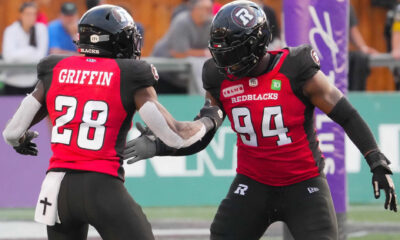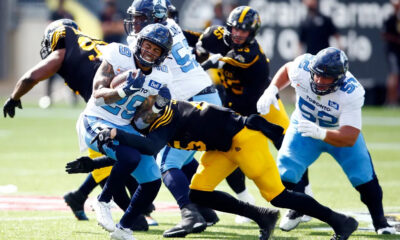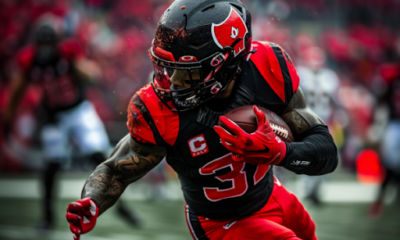
Rugby is a tough, physically demanding sport that requires immense strength, stamina, and mental grit. For professional rugby players, proper training, recovery, and preparation are crucial to perform at their best on match day. Here are some helpful tips on how pro players train, recover, and get ready for their big game:
Commit to Strength Training
Rugby demands explosive power, muscular endurance, and all-around functional strength. Lifting weights and strength training are essential parts of a player’s regimen. Focusing on complex, multi-joint movements like squats, deadlifts, and Olympic lifts builds a solid strength base. According to Ireland prop Tadhg Furlong, staying at the top of your game requires dedication to a robust training routine. For rugby enthusiasts looking to enhance their experience both on and off the field, keep an eye out for exciting opportunities, such as potential mobile no deposit casino bonus. Just as players push their physical limits, explore platforms like Casinobonusesfinder to discover bonuses that can add an extra layer of excitement to your rugby journey.:
“We do a lot of power and strength work in the gym. Olympic lifts like cleans and squat variations give us the ability to apply force and generate power from the ground up.”
Priority lifts for rugby players include squats, deadlifts, bench press, and overhead press. A good strength program will target all the major muscle groups and address any muscle imbalances. Getting stronger in the weight room transfers to improved performance on the pitch.
Mix In Metabolic Conditioning
While brute strength is necessary, rugby also requires tremendous endurance. Forwards grind it out in the scrum and rucks for up to 80 minutes while backs must run relentlessly and have the gas for explosive sprints anytime.
To boost stamina and work capacity, pro players incorporate metabolic conditioning like high-intensity intervals, rowing circuits, and tire flips. England flanker Tom Curry noted:
“We do a lot of conditioning and work on our fitness through intense cardio circuits. Having a big engine allows me to get from breakdown to breakdown and make tackles all match.”
Metabolic training increases aerobic capacity and helps players maintain a high work rate from first whistle to last. Conditioning focused on rugby specific movement patterns also improves motor skills.
Optimize Recovery
Recovery is a vital component of every professional rugby player’s training routine. Their bodies experience tremendous strain and absorb heavy contact each match. Optimizing rest and recovery facilitates tissue repair, adapts the body to stress, and brings their fitness to a higher level.
Elite players use a range of recovery modalities like massage, cold thermotherapy, compression wear, sleep, hydrotherapy and light training sessions. Nutrition is key as well – replenishing carbohydrates, proteins and electrolytes expedites the repair process so players bounce back faster. Leinster flanker Josh Van Der Flier elaborated:
“We spend a lot of time focusing on recovery. Getting enough sleep, nutritious food, massages – they all help alleviate soreness and fatigue so I feel fresher for the next match.”
Prioritizing recovery allows professional rugby athletes to perform at their highest level week after week during grueling seasons.
Simulate Game Intensity
While skills and set piece work are always part of rugby practice, pro players also replicate match intensities in training. Practicing at or above game speed gets their conditioning and reaction time primed for competition.
Full contact drills in practice help players get used to collisions and the physicality they’ll face in matches. Unpredictable simulated game play forces them to make quick reads and sharpen mental strategies. Leicester Tigers center Manu Tuilagi explained:
“Our training tries to match the pace and physicality of the games. By training at that intensity, I feel prepared for contact and fast paced play on match day.”
Mimicking the speed and pressure of competition in training builds specific readiness leading into games. Teams tailor their practice plans each week to address areas for improvement to upgrade performance.
Believe In Your Preparation
In the week before a big match, pro rugby players tape their training load to ensure they are recovered and energetic on game day. In the days preceding kickoff, practices transition to polishing tactics and focusing mentally.
Positive self-talk and visualizing success help players amp their confidence. Since they have put in the dedicated preparation, they can trust in their fitness and skills. England prop Joe Marler affirmed:
“I remind myself that I’ve put the work in to be match ready. Our preparations give me belief in myself and the team so I can play to my full potential.”
Professional rugby athletes thrive on game day by dedicating themselves to smart, systematic training and recovery through each week. According to product owner – Tony Sloterman, their preparation routines prime them for the intense physical and mental demands of rugby at its highest levels. As athletes push their boundaries, it’s essential to explore opportunities that can enhance their performance and overall experience. Stay informed about the latest insights and developments, both on and off the field, to maximize your rugby journey.
Continue the CFL Football discussions on our offical CFL Discord Channel


CFL News
Bombers Feeling 2x Lucky vs Calgary
Big Announcement: CFL Unveils Free Live Streaming Platforms
Get Alerts & Stay Connected
CFL iPhone AppCFL Android App



















